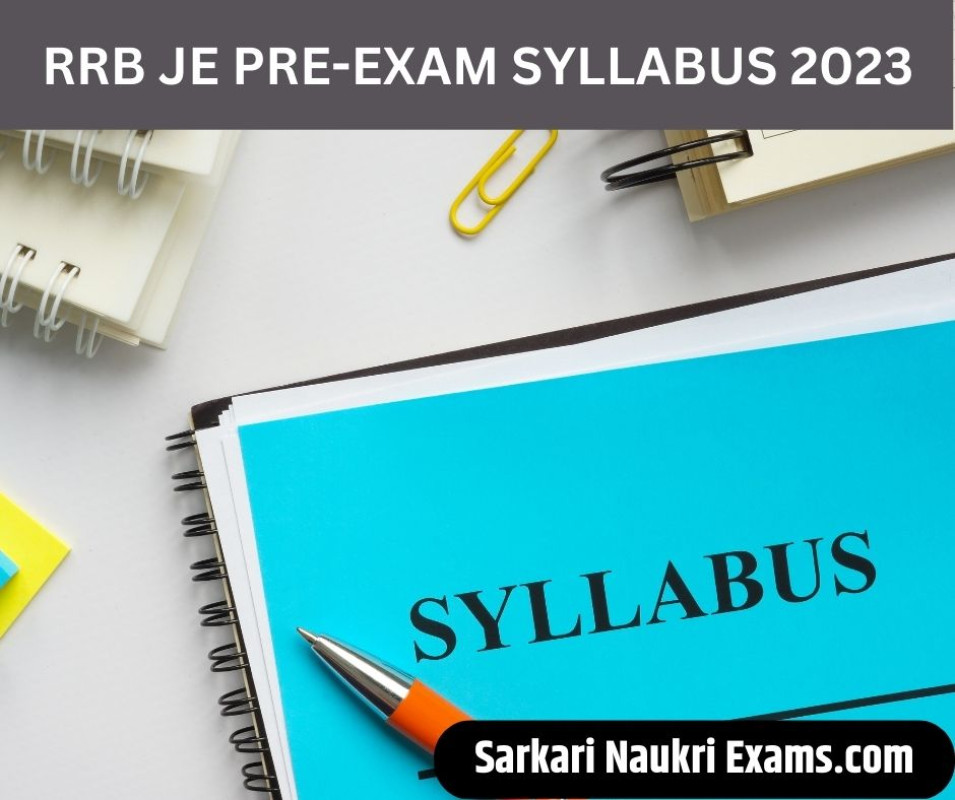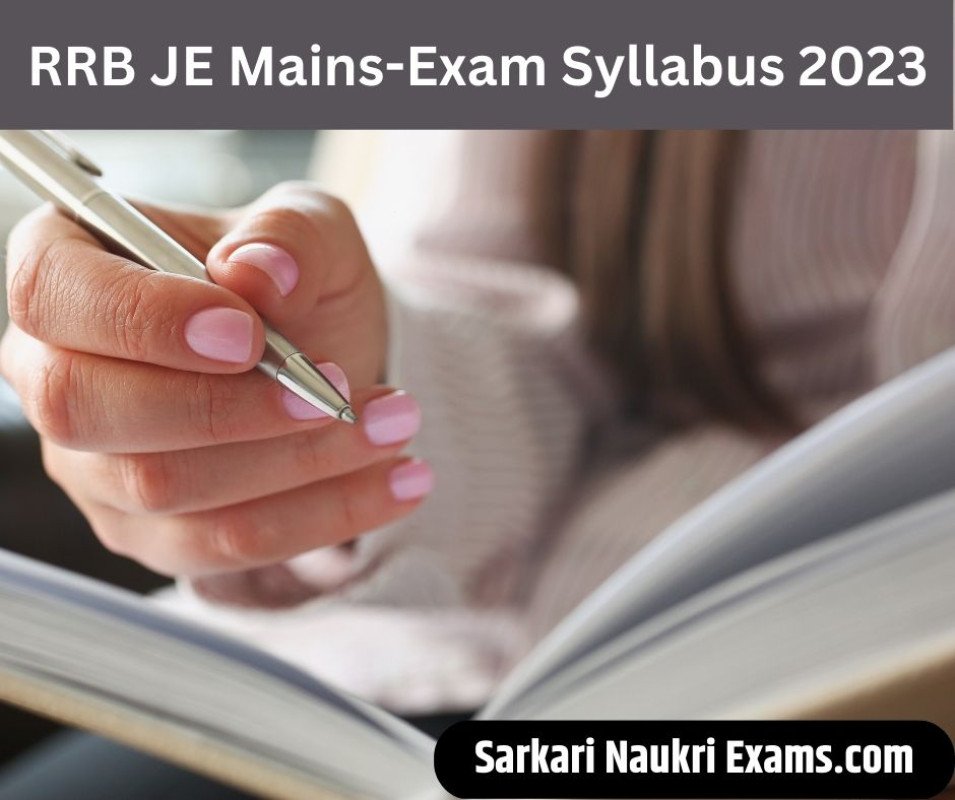RRB JE Syllabus 2024 | Junior Engineer | Download Link, Latest Exam Pattern

RRB JE Pre-Exam Paper Pattern

Organization
Railway Recruitment Board
Exam Mode
Online (CBT)
Exam Level
12th (Intermediate)
Exam Type
Objective (MCQ)
Paper Medium
Hindi & English (Except language subject)
Total Question
100
Total Marks
100
Total Time (Minutes)
90
Correct Answer (Marks)
01
Negative Marking
-1/4
Cut Off Marks
Paper
Paper 1
Subject Details
1. 📖 General Mathematics
-
Arithmetic: Basic operations of addition, subtraction, multiplication, and division. Fractions, decimals, percentages, and ratios.
-
Algebra: Linear and quadratic equations, inequalities, polynomials, exponents, and logarithms.
-
Geometry: Basic concepts of points, lines, angles, and planes. Properties of triangles, circles, and polygons. Conic sections.
-
Trigonometry: Trigonometric ratios, identities, and functions. Applications of trigonometry in solving problems.
2. 📖 General Science
The syllabus for General Science typically covers a wide range of topics in the areas of physics, chemistry, biology, and environmental science. The following topics are typically covered in the General Science syllabus:
-
Physics: Mechanics, Waves, Thermodynamics, Electricity, Magnetism, Optics, and Modern Physics.
-
Chemistry: Chemical bonding and reactions, Acids and Bases, Solutions, Gases, Electrochemistry, and Organic Chemistry.
-
Biology: Cell Biology, Genetics, Evolution, Ecology, Human Anatomy and Physiology, and Microbiology.
-
Environmental Science: Natural resources, Ecosystems, Pollution, Global warming, and Climate change.
-
Scientific Methods: Experimental design, Data analysis, and Scientific communication
3. 📖 Reasoning
- Analogies
- Classification
- Series Completion
- Coding-Decoding
- Blood Relations
- Direction Sense Test
- Logical Venn Diagrams
- Alphabet Test
- Number, Ranking, and Time Sequence Test
- Mathematical Operations
- Arithmetical Reasoning
4. 📖General Knowledge
I. Indian Polity and Constitution
- Indian Constitution
- Preamble
- Fundamental Rights and Duties
- Directive Principles of State Policy
- Union and State Executive
- Parliament
- Judiciary
- Electoral System
- Emergency Provisions
- Important Constitutional Amendments
II. Indian Economy
- Economic Development
- Five Year Plans
- Budget and Fiscal Policy
- Monetary Policy
- Inflation
- Banking and Finance
- Foreign Trade
- Agriculture and Rural Development
- Industry and Infrastructure
- Demography and Human Development
III. Science and Technology
- General Science
- Space Science
- Computer Science
- Information Technology
- Biotechnology
- Nanotechnology
- Recent Inventions and Discoveries
- Health and Diseases
IV. Environment and Ecology
- Biodiversity
- Environmental Pollution
- Climate Change
- Ozone Depletion
- Sustainable Development
- National Parks and Wildlife Sanctuaries
- Environmental Laws and Regulations
V. Current Affairs
- National and International News
- Awards and Honors
- Books and Authors
- Sports and Games
- Science and Technology
- Political News
- Business and Economics
- Environmental Issues
VI. Miscellaneous
- Geography
- History
- Art and Culture
- Important Days and Dates
- Famous Personalities
- Government Policies and Schemes
- International Organizations and their Headquarters.
RRB JE Mains-Exam Paper Pattern

Organization
Railway Recruitment Board
Exam Mode
Online (CBT)
Exam Level
12th (Intermediate)
Exam Type
Objective (MCQ)
Paper Medium
Hindi & English (Except language subject)
Total Question
150
Total Marks
150
Total Time (Minutes)
120
Correct Answer (Marks)
01
Negative Marking
-1/4
Cut Off Marks
Paper
Paper 1
Subject Details
1. 📖General Knowledge
I. Indian Polity and Constitution
- Indian Constitution
- Preamble
- Fundamental Rights and Duties
- Directive Principles of State Policy
- Union and State Executive
- Parliament
- Judiciary
- Electoral System
- Emergency Provisions
- Important Constitutional Amendments
II. Indian Economy
- Economic Development
- Five Year Plans
- Budget and Fiscal Policy
- Monetary Policy
- Inflation
- Banking and Finance
- Foreign Trade
- Agriculture and Rural Development
- Industry and Infrastructure
- Demography and Human Development
III. Science and Technology
- General Science
- Space Science
- Computer Science
- Information Technology
- Biotechnology
- Nanotechnology
- Recent Inventions and Discoveries
- Health and Diseases
IV. Environment and Ecology
- Biodiversity
- Environmental Pollution
- Climate Change
- Ozone Depletion
- Sustainable Development
- National Parks and Wildlife Sanctuaries
- Environmental Laws and Regulations
V. Current Affairs
- National and International News
- Awards and Honors
- Books and Authors
- Sports and Games
- Science and Technology
- Political News
- Business and Economics
- Environmental Issues
VI. Miscellaneous
- Geography
- History
- Art and Culture
- Important Days and Dates
- Famous Personalities
- Government Policies and Schemes
- International Organizations and their Headquarters.
2. 📖Physics and Chemistry
Physics: I. Mechanics
- Kinematics
- Laws of Motion
- Work, Energy, and Power
- System of Particles and Rotational Motion
- Gravitation
II. Heat and Thermodynamics
- Thermometry and Calorimetry
- Laws of Thermodynamics
- Heat Transfer
- Kinetic Theory of Gases
III. Optics
- Reflection and Refraction of Light
- Optical Instruments
- Wave Nature of Light
- Interference, Diffraction, and Polarization of Light
IV. Electricity and Magnetism
- Electric Charge and Field
- Electrostatic Potential and Capacitance
- Electric Current
- Magnetic Effects of Electric Current
- Magnetism and Matter
- Electromagnetic Induction and Alternating Currents
V. Modern Physics
- Dual Nature of Matter and Radiation
- Atoms and Nuclei
- Semiconductor Electronics
- Communication Systems
Chemistry: I. Physical Chemistry
- States of Matter
- Atomic Structure
- Chemical Bonding and Molecular Structure
- Chemical Thermodynamics
- Equilibrium
- Solutions
II. Inorganic Chemistry
- Periodic Table and Periodic Properties
- Chemical Families: Alkali Metals, Alkaline Earth Metals, Halogens, and Noble Gases
- Hydrogen
- s-Block Elements
- p-Block Elements
- d- and f-Block Elements
- Coordination Compounds
III. Organic Chemistry
- Basics of Organic Chemistry
- Hydrocarbons
- Organic Compounds Containing Oxygen
- Organic Compounds Containing Nitrogen
- Polymers
- Biomolecules
- Environmental Chemistry
IV. Analytical Chemistry
- Basics of Analytical Chemistry
- Gravimetric Analysis
- Volumetric Analysis
- Chromatography and Spectroscopy
V. Applied Chemistry
- Chemistry in Everyday Life
- Industrial Chemistry
- Environmental Chemistry
- Nuclear Chemistry
3. 📖Basics of Computer and Application
I. Introduction to Computers
- Definition and Evolution of Computers
- Classification of Computers
- Components of Computer System
- Input/Output Devices
- Storage Devices
II. Operating Systems
- Basics of Operating Systems
- Types of Operating Systems
- Functions of Operating Systems
- GUI and Command-Line Interface
III. Word Processing
- Introduction to Word Processing
- Basic Features of Word Processing Software
- Editing and Formatting Text
- Working with Tables, Columns, and Graphics
- Mail Merge
IV. Spreadsheets
- Introduction to Spreadsheets
- Basic Features of Spreadsheet Software
- Creating and Editing Worksheets
- Using Formulas and Functions
- Charts and Graphs
V. Presentations
- Introduction to Presentations
- Basic Features of Presentation Software
- Creating and Editing Slides
- Formatting Text and Graphics
- Slide Transitions and Animations
VI. Internet and World Wide Web
- Introduction to the Internet
- Browsers and Search Engines
- E-mail and Social Media
- Web Design and Development
- HTML and CSS
VII. Programming Concepts
- Basics of Programming
- Types of Programming Languages
- Program Design and Development
- Control Structures
- Data Types and Variables
VIII. Database Management
- Basics of Database Management Systems
- Relational Database Management Systems
- Normalization and Entity-Relationship Model
- Structured Query Language (SQL)
- Database Design and Development
IX. Computer Security and Ethics
- Computer Security Threats
- Security Measures and Techniques
- Ethical Issues in Computing
- Intellectual Property Rights
- Cybercrime and Cyber Law.
4. 📖Basics of Environment and Pollution Control
I. Introduction to Environmental Science
- Definition and Scope of Environmental Science
- Components of Environment
- Environmental Issues and Challenges
- Sustainable Development and Green Technology
II. Ecology
- Basic Principles of Ecology
- Ecosystems and their Types
- Biodiversity and its Importance
- Conservation and Management of Natural Resources
- Climate Change and Global Warming
III. Environmental Pollution
- Definition and Types of Pollution
- Sources and Causes of Pollution
- Effects of Pollution on Human Health and the Environment
- Control and Prevention Measures of Pollution
IV. Air Pollution
- Types and Sources of Air Pollution
- Criteria Pollutants and their Health Effects
- Control and Prevention Measures of Air Pollution
- Indoor Air Pollution and its Effects
V. Water Pollution
- Types and Sources of Water Pollution
- Effects of Water Pollution on Human Health and the Environment
- Control and Prevention Measures of Water Pollution
- Wastewater Treatment and Management
VI. Soil Pollution
- Types and Sources of Soil Pollution
- Effects of Soil Pollution on Human Health and the Environment
- Control and Prevention Measures of Soil Pollution
- Soil Conservation and Management
VII. Solid Waste Management
- Types and Sources of Solid Waste
- Effects of Solid Waste on Human Health and the Environment
- Control and Prevention Measures of Solid Waste
- Waste Treatment and Disposal Techniques
VIII. Noise Pollution
- Types and Sources of Noise Pollution
- Effects of Noise Pollution on Human Health and the Environment
- Control and Prevention Measures of Noise Pollution
- Noise Pollution Regulations
IX. Environmental Impact Assessment (EIA)
- Definition and Purpose of EIA
- Process and Methods of EIA
- Environmental Clearance and Monitoring
- Case Studies on EIA
5. 📖Technical Abilities
- Basic concepts of Science and Engineering: The syllabus covers basic concepts of Physics, Chemistry, and Engineering (including units and measurements, laws of motion, work, energy and power, heat and temperature, mechanics of solids and fluids, etc.)
-
Electrical Engineering: Electrical Machines, Power Electronics, Electrical Measurements and Instrumentation, Electric Circuits, Power Systems, Analog and Digital Electronics, Control Systems.
-
Electronics Engineering: Electronic Devices, Digital Electronics, Analog Electronics, Network Analysis, Control Systems, Signals and Systems, Communication Systems, Electromagnetic Theory.
-
Civil Engineering: Building Materials, Surveying, Estimating, Costing, Soil Mechanics, Hydraulics, Concrete Technology, Irrigation Engineering, Transportation Engineering.
-
Mechanical Engineering: Engineering Mechanics, Thermodynamics, IC Engines, Refrigeration and Air Conditioning, Heat Transfer, Manufacturing Technology, Strength of Materials, Theory of Machines, and Machine Design.
-
Computer Science and Information Technology: Computer Fundamentals, Programming in C++, Data Structures, Operating Systems, Databases, Computer Networks, Software Engineering, and Web Technologies.
The syllabus may vary slightly from one recruitment cycle to another, so it is important to check the official notification for the exact syllabus.

Comments-
Sarkari Naukri Exams-
Thanks for visiting us!
If you have any question please add a comment.
We will reply within 24 Hours.
Thanks & Regards!
Sarkari Naukri Exams.
Updated:
Highlights
Advertisements
Comment